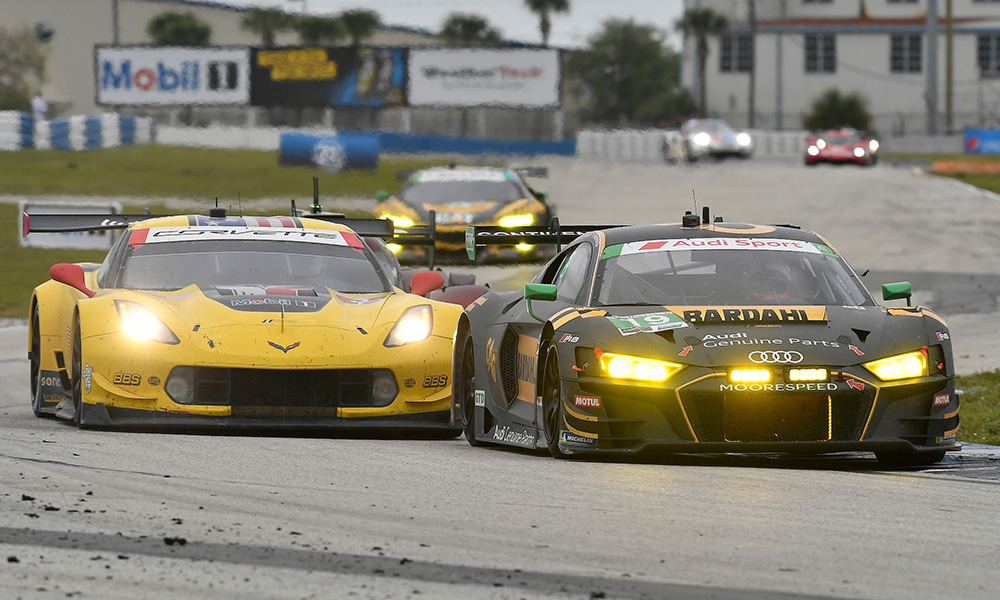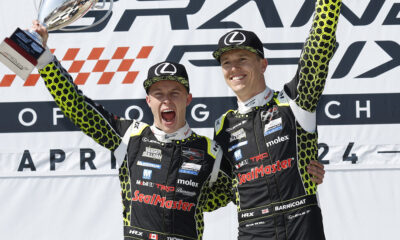
Photo: Scott LePage/IMSA
IMSA President Scott Atherton has expressed the desire to re-open GT convergence talks in order to be “proactive” on the potential fate of the GTE platform.
Atherton, however, stressed that the GT Le Mans class in the IMSA WeatherTech SportsCar Championship is in no immediate threat, amid the impending start of another regulations cycle with new content from Corvette and Porsche.
While currently featuring six manufacturers, the factory Ford GT program comes to an end this year, with BMW pulling out of the WEC, leaving a six-car class grid with three brands for the 2019-20 WEC season.
IMSA’s GTLM class, meanwhile, is expected to feature only six full-season cars next year as well, with factory efforts from Corvette, Porsche and BMW, which remains in WeatherTech Championship competition through at least 2020.
The entry forecast beyond next season, however, remains unclear for both championships.
“Ironically, we share a similar set of circumstances with the ACO, albeit with different players,” Atherton told Sportscar365. “One constant being Porsche.
“It’s a topic of active discussion internally, as well as between ourselves and the ACO. We all recognize the situation.”
While describing the class as “robust” and providing “wonderful” competition, Atherton said IMSA is mindful of the current forecast, which sees no new manufacturers in the immediate pipeline.
“We are of the opinion that we need to be proactive, in terms of looking out over the horizon,” he said. “Looking longer term, it’s our opinion that convergence or harmonization should be back on the agenda.”
Atherton said the prospects of a single GT platform would still be “a couple of years out” due to the start of new three-year regulation cycles for both GT3 and GTE that began in 2019 and 2019/20, respectively.
It would leave 2022 as the earliest window for a possible converged platform.
“Personally, and collectively on behalf of IMSA, we love the GTE class,” Atherton said.
“We hope that it could continue. But if it’s in jeopardy, let’s have an open dialogue with the manufacturers that are involved with the rules makers, so that we ensure the future of GT racing.”
As previously reported by Sportscar365, discussions on the next-generation GT3 regulations have been ongoing in technical working group meetings.
GT3-Based Cars in GTLM ‘Not an Option’
Despite having accepted GT3-based machinery into its GTLM class in the past, with BMW’s adapted version of the M6, Atherton said they have no plans to entertain that option again due to its “problematic” integration.
He instead suggested that the lifespan of GTLM would likely play out naturally.
“Having been around this space a long time and having seen a similar set of circumstances play out when it was GT1 and GT2, there were a couple of long seasons,” Atherton said.
“In our example, in the American Le Mans Series, we had Corvette racing Corvette. We all made the best of it, and survived it, but it wasn’t ideal.
“Knowing what we know and having vivid recall of how that process came to be, let’s be proactive to avoid a similar set of circumstances.
“You’re in a situation where if you lose one, or heaven forbid two, you’re in that mode.
“Look at the alternative of the diversity of the headcount in GTD, and the same thing applies with the same thing the ACO is dealing with at the WEC level.”
IMSA holds a key place around the table of GT regulations, with its VP of Competition, Simon Hodgson, serving as the Vice President of the FIA GT Commission.
Atherton said he would ideally envision a common platform featuring an all-pro/factory “version” and a pro-am customer racing “approach”.
Manufacturer Support Key to GT Convergence
At least two previous attempts of GT convergence were made in recent years, most recently in 2014, although the plan was ultimately rejected by several manufacturers.
BMW Motorsport director Jens Marquardt has long been a proponent of a single GT platform, with the German manufacturer scheduled to roll out with an all-new GT3 car for 2022.
“I have always been a big fan of convergence,” he told Sportscar365. “I’ve told that many times. I think we had opportunities, unfortunately we didn’t take them.
“What we have now is a result of that and we’ll have to live with it and we’ll have to see.”
Pascal Zurlinden, Porsche’s director of GT factory motorsports, meanwhile, believes that GTE can survive and stressed the importance of maintaining separate platforms for factory and pro-am racing.
“The GTE that we have with the manufacturers we have right now is quite stable,” he told Sportscar365.
“There were always ups and downs with two or three manufacturers, and now it’s peaked at six, but it goes a bit down now with three, and all-in-all four or five.
“Let’s see if we can keep all the manufacturers in this class which is one of the best for endurance racing. GTD and GT3 don’t really compare.
“GT3 is fully customer racing and GTE is for endurance.”
Daniel Lloyd contributed to this report

























